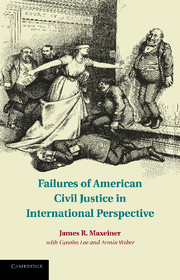Foreword
Published online by Cambridge University Press: 07 September 2011
Summary
Foreword
Philip K. Howard
In one of the lands in Gulliver’s Travels, called Lagado, everyone follows a theory slavishly, with consistently disastrous results. Houses fall down because the inhabitants don’t believe in right angles. Clothes don’t fit because they’re made pursuant to a mathematical calculation. Lagado is a place, as Jonathan Swift describes it, where inhabitants don’t care whether things actually work. What they care about is their theory.
Swift could have written a similar chapter about America’s system of civil justice. Everyone reading this book knows the theory: a completely neutral system in which judges see their job as referees of an adversarial process, with the ultimate verdict rendered by a jury picked (more or less) at random. This theory of justice has one predominant virtue: impartiality. No one can claim the fix is in when the judge lets parties claim almost anything, lets them seek discovery under every pebble for years, and then, if the parties can last it out, lets the jury make all important decisions. It’s either thumbs up or thumbs down. Defenders of the system see in this theory an almost incarnation of our national values: Former Senator John Edwards, a successful trial lawyer, praised the system in an essay in Newsweek entitled “Juries: Democracy in Action.”
- Type
- Chapter
- Information
- Failures of American Civil Justice in International Perspective , pp. xiii - xviPublisher: Cambridge University PressPrint publication year: 2011

